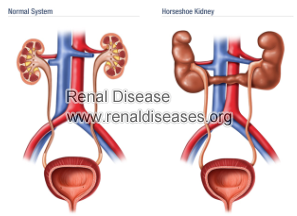Whatsapp: +8615512139310
- Email us:
 How horseshoe kidney affects renal function? After seeing this question, some people may put forward the question about what is the horseshoe kidney? How does it occur? If you are interested in these topics, please read on and you will benefit a lot from the passage.
How horseshoe kidney affects renal function? After seeing this question, some people may put forward the question about what is the horseshoe kidney? How does it occur? If you are interested in these topics, please read on and you will benefit a lot from the passage.
What is horseshoe kidney?
The horseshoe kidney is the most common type of renal fusion anomaly. The kidney are fused to together at lower part or base. By fusing, they form a “U” shape, which gives it the name “horseshoe kidney”. It is a congenital disorder affecting about 1 in 500 to 1000 people, especially children.
How does it occur?
This type of kidney disease occurs during fetal development, as the kidneys move into their normal position in the flank area. It can occur alone or in combination with other disorders. The most common disorders seen with horseshoe kidney include Turner Syndrome and Trisomy 18.
How does horseshoe kidney affect renal function?
It seems that horseshoe kidney does not affect kidney function superficially, but it can cause numerous symptoms and complications which affect renal function and threaten patients’ life.
What are the symptoms of horseshoe kidney?
If a child happen to be a patient with horseshoe kidney, then, it may experience the following symptoms:
Urinary tract infection-usually uncommon in children under 5 years and unlikely in boys at any age.
Kidney stone-if the stone remain in the kidney, there may have no symptoms. Once the stones pass through the urinary tract, the common symptoms include: flank pain, restlessness, sweating, nausea and/or vomiting, blood in urine, changes in urinary frequency, chills, fever, cloudy urine.
Hydronephrosis-occurs when there is a urinary tract obstruction and the kidney become enlarged and potentially damaged. The common symptoms include abdominal mass, poor weight gain, decreased urination and urinary tract infection.
What are the common complications of horseshoe kidney?
One-third of people with horseshoe kidneys have at least one other complication involving the cardiovascular system, the central nervous system or the genitourinary system, such as kidney stones, hydronephrosis, renal cancer or polycystic kidney disease, hydrocepaly and spina bifida, gastrointestinal problems.
All of them can cause further kidney damage for patients if left untreated. More detailed info about horseshoe kidney, please talk with our doctors online directly or email to renal-disease@hotmail.com